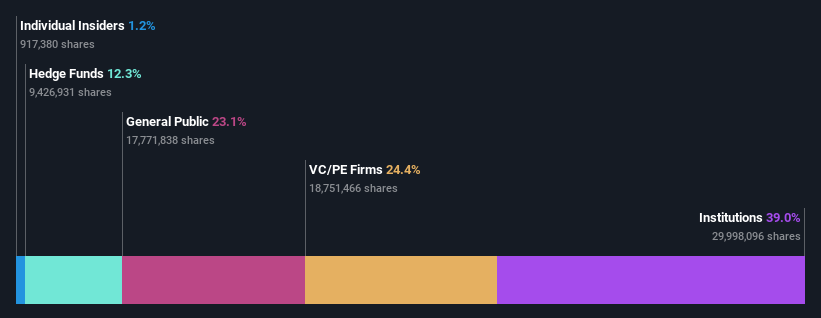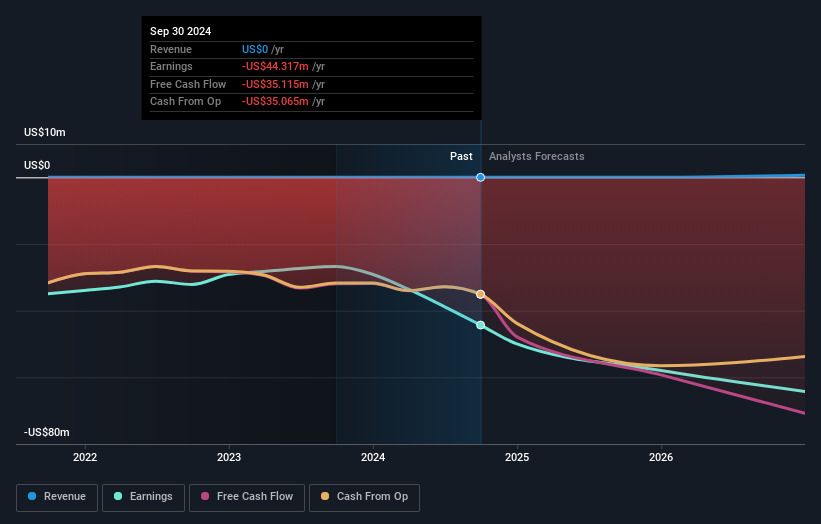- United States
- /
- Pharma
- /
- NasdaqGM:TRVI
Institutional investors control 39% of Trevi Therapeutics, Inc. (NASDAQ:TRVI) and were rewarded last week after stock increased 38%

Key Insights
- Given the large stake in the stock by institutions, Trevi Therapeutics' stock price might be vulnerable to their trading decisions
- A total of 8 investors have a majority stake in the company with 53% ownership
- Using data from analyst forecasts alongside ownership research, one can better assess the future performance of a company
To get a sense of who is truly in control of Trevi Therapeutics, Inc. (NASDAQ:TRVI), it is important to understand the ownership structure of the business. The group holding the most number of shares in the company, around 39% to be precise, is institutions. In other words, the group stands to gain the most (or lose the most) from their investment into the company.
And last week, institutional investors ended up benefitting the most after the company hit US$191m in market cap. The gains from last week would have further boosted the one-year return to shareholders which currently stand at 181%.
Let's delve deeper into each type of owner of Trevi Therapeutics, beginning with the chart below.
Check out our latest analysis for Trevi Therapeutics

What Does The Institutional Ownership Tell Us About Trevi Therapeutics?
Many institutions measure their performance against an index that approximates the local market. So they usually pay more attention to companies that are included in major indices.
We can see that Trevi Therapeutics does have institutional investors; and they hold a good portion of the company's stock. This suggests some credibility amongst professional investors. But we can't rely on that fact alone since institutions make bad investments sometimes, just like everyone does. When multiple institutions own a stock, there's always a risk that they are in a 'crowded trade'. When such a trade goes wrong, multiple parties may compete to sell stock fast. This risk is higher in a company without a history of growth. You can see Trevi Therapeutics' historic earnings and revenue below, but keep in mind there's always more to the story.

Our data indicates that hedge funds own 12% of Trevi Therapeutics. That worth noting, since hedge funds are often quite active investors, who may try to influence management. Many want to see value creation (and a higher share price) in the short term or medium term. New Enterprise Associates, Inc. is currently the company's largest shareholder with 15% of shares outstanding. For context, the second largest shareholder holds about 9.6% of the shares outstanding, followed by an ownership of 6.5% by the third-largest shareholder.
On further inspection, we found that more than half the company's shares are owned by the top 8 shareholders, suggesting that the interests of the larger shareholders are balanced out to an extent by the smaller ones.
While it makes sense to study institutional ownership data for a company, it also makes sense to study analyst sentiments to know which way the wind is blowing. There are a reasonable number of analysts covering the stock, so it might be useful to find out their aggregate view on the future.
Insider Ownership Of Trevi Therapeutics
The definition of company insiders can be subjective and does vary between jurisdictions. Our data reflects individual insiders, capturing board members at the very least. The company management answer to the board and the latter should represent the interests of shareholders. Notably, sometimes top-level managers are on the board themselves.
Most consider insider ownership a positive because it can indicate the board is well aligned with other shareholders. However, on some occasions too much power is concentrated within this group.
We can see that insiders own shares in Trevi Therapeutics, Inc.. In their own names, insiders own US$2.3m worth of stock in the US$191m company. It is good to see some investment by insiders, but we usually like to see higher insider holdings. It might be worth checking if those insiders have been buying.
General Public Ownership
The general public-- including retail investors -- own 23% stake in the company, and hence can't easily be ignored. While this size of ownership may not be enough to sway a policy decision in their favour, they can still make a collective impact on company policies.
Private Equity Ownership
With a stake of 24%, private equity firms could influence the Trevi Therapeutics board. Sometimes we see private equity stick around for the long term, but generally speaking they have a shorter investment horizon and -- as the name suggests -- don't invest in public companies much. After some time they may look to sell and redeploy capital elsewhere.
Next Steps:
While it is well worth considering the different groups that own a company, there are other factors that are even more important. Be aware that Trevi Therapeutics is showing 4 warning signs in our investment analysis , and 1 of those shouldn't be ignored...
But ultimately it is the future, not the past, that will determine how well the owners of this business will do. Therefore we think it advisable to take a look at this free report showing whether analysts are predicting a brighter future.
NB: Figures in this article are calculated using data from the last twelve months, which refer to the 12-month period ending on the last date of the month the financial statement is dated. This may not be consistent with full year annual report figures.
Valuation is complex, but we're here to simplify it.
Discover if Trevi Therapeutics might be undervalued or overvalued with our detailed analysis, featuring fair value estimates, potential risks, dividends, insider trades, and its financial condition.
Access Free AnalysisHave feedback on this article? Concerned about the content? Get in touch with us directly. Alternatively, email editorial-team (at) simplywallst.com.
This article by Simply Wall St is general in nature. We provide commentary based on historical data and analyst forecasts only using an unbiased methodology and our articles are not intended to be financial advice. It does not constitute a recommendation to buy or sell any stock, and does not take account of your objectives, or your financial situation. We aim to bring you long-term focused analysis driven by fundamental data. Note that our analysis may not factor in the latest price-sensitive company announcements or qualitative material. Simply Wall St has no position in any stocks mentioned.
About NasdaqGM:TRVI
Trevi Therapeutics
A clinical-stage biopharmaceutical company, focuses on the development and commercialization of investigational therapy for the treatment of chronic cough in patients with idiopathic pulmonary fibrosis (IPF) and non-IPF interstitial lung disease, and refractory chronic cough.
Flawless balance sheet slight.
Market Insights
Community Narratives



